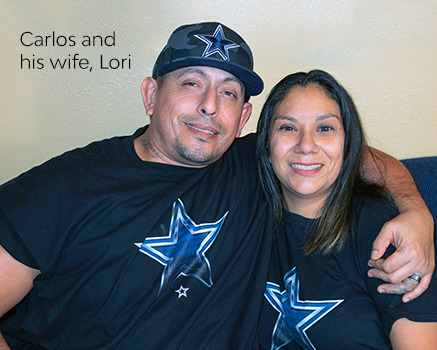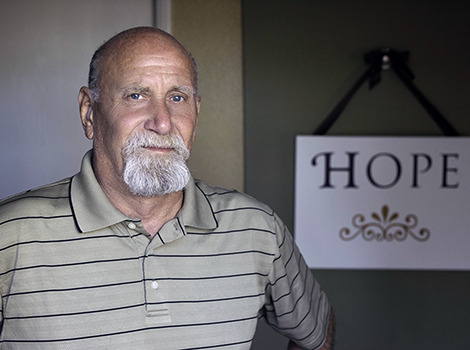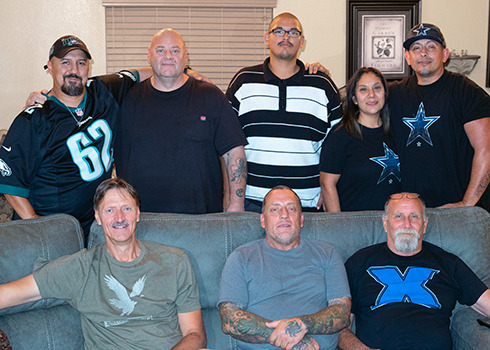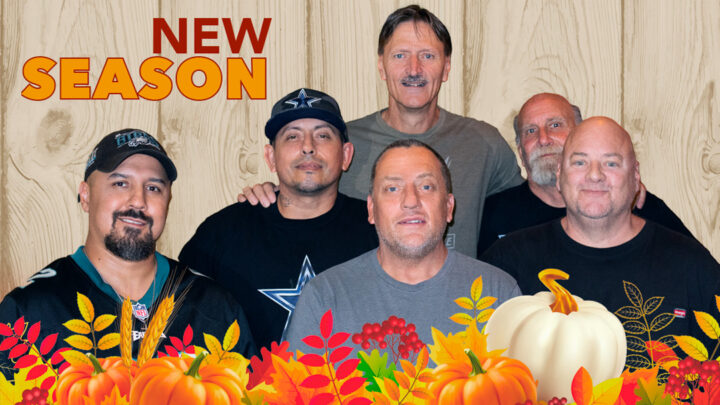For years, we’ve watched people complete our Recovery Program and then struggle in their new season of life. Though they’ve received the tools to continue living a sober life, some can feel isolated, alone, and scared.
Isolation can derail recovery, whereas community can prevent relapse. And while we are proud of the success we’ve had in our Recovery Program, we know that we could and should be doing more to help during that transitional season.
We recently opened our first Transformed House—a transitional home that can house up to 15 men at a time. We’ve created a Transformation Program for the men in this house, which includes accountability, ongoing peer and case manager support, and ongoing soft skills training.
Each individual must pay a small program fee while living there. They must also commit to their sobriety, lend a hand in the housework, and support each other in fellowship. Our long-term goal is to help these men build a strong, healthy support network moving into independent living. We believe this structure–and a strong sense of community–will provide the time and tools they need to maintain sobriety and find enduring success in their recovery.
Helping people move from Homeless to Wholeness…

But what does wholeness look like? There are many definitions for living a whole and complete life, as it is subjective and personal. However, for some, that could mean overcoming obstacles that previously held them back. It could mean finding authentic joy and fulfillment, living with contentment, or finding peace with one’s family, relationships, work, etc. For others, it could mean finding and developing a personal relationship with their creator—seeking intimacy with and obedience to God—and finding their purpose and meaning. For others, it could mean finding and maintaining employment, finding and maintaining housing, working to maintain sobriety—finally breaking the chains that had once held them down. Or wholeness is all of these things. And more.
For Carlos (September’s Legacy Testimony), he found wholeness in his family, his relationship with his fiancée Lori, and Christ Jesus.
More than five years ago, Carlos hit rock bottom after years of alcohol and drug addiction. He had lost his job, his family relationships were unraveling, and he wound up homeless on the streets of Tucson. One winter night, hungry and drinking from a bottle, he wandered into the Gospel Rescue Mission, hoping to get a free sandwich. However, once at the mission, the staff provided more than a meal. They showed Carlos kindness and encouraged him to join the Recovery Program. Though skeptical at first, Carlos agreed to give it a try. He was tired of the life he was living. In the program, Carlos found a supportive community amongst the staff, volunteers, and other guests who were also working on getting sober. After a short time, Carlos committed himself to Christ, and his life was utterly transformed in our Recovery Program.
But what really happens after you leave Recovery?
Completing the Recovery Program is a monumental achievement for o ur guests–it represents a year of hard work and dedication, growth and healing, self-reflection, self-discovery as they find their true purpose and potential, and transformation. However, the harsh reality is that, according to a US National Institute on Drug Abuse (NIDA) study, between 40% and 60% of people with substance use disorders will relapse. So, how can we support our guests when they finish Recovery?
ur guests–it represents a year of hard work and dedication, growth and healing, self-reflection, self-discovery as they find their true purpose and potential, and transformation. However, the harsh reality is that, according to a US National Institute on Drug Abuse (NIDA) study, between 40% and 60% of people with substance use disorders will relapse. So, how can we support our guests when they finish Recovery?
Carlos was one of many who found long-term success in our Recovery Program. He recently visited the Transformed House to hang out with Wes and some of the other graduates, and shared with them this truth:

“It wasn’t just the Program. It was the sense of family—the brotherhood—and the people who actually care and want to see you succeed.”
Completing the Recovery Program wasn’t the end of Carlos’ journey. Though free from his past life, he still had to walk through the mess he had left behind. For him, that meant regaining custody of his children and restoring broken relationships. Carlos was also blessed to share this new journey with a woman he fell in love with named Lori. Together, they found stability in their lives. It wasn’t easy, but they took it one day at a time by leaning on each other’s strength and keeping God at the center. Carlos also kept in touch with the friends he had made and the community surrounding Gospel Rescue Mission.
For Carlos, what once seemed impossible is now his reality. Thanks to his relationship with Christ. Thanks to people who cared. And thanks to you.
Now, Imagine you’ve spent the last 12 months living at Gospel Rescue Mission.
Someone else has planned your daily schedule, and every detail of your life has been taken care of. You haven’t had to think about what to eat, where to go, where to sleep. All you’ve had to worry about is getting healthy and working on your program. Now, you are getting ready to transition out of this safe environment back into the world.
It is scary.
This is something Wes Shepherd understands better than most. Wes has been a faithful employee of ours for 19 years. And though Wes is celebrating 21 years of sobriety this year, he remembers all too well the challenge of transitioning from his old life into independent living.
“It’s a time of high anxiety, and that transition period is crucial to people’s recovery.”
During this crucial time of transition, we work with people like Carlos to develop the life skills they’ve lost over the years. Some of these things might seem simple – like going to the grocery store on a field trip or teaching time management, budgeting, and cooking. Some skills are much more complicated, like helping them develop a healthy support system they can rely on when they make mistakes or encounter challenges because both challenges and mistakes will happen during this journey from homeless to wholeness.
And as Wes, Carlos, or any other successful graduate of our Recovery Program will tell you – the most important piece of their continued sobriety and success is staying connected to a supportive community. People they can be honest with, lean on, go to for help, and trust will pray for them and show them grace and love as they continue the battle. We’ve worked hard to cultivate that incredible community and are really proud of it because we know its impact on our graduates is truly eternal.

